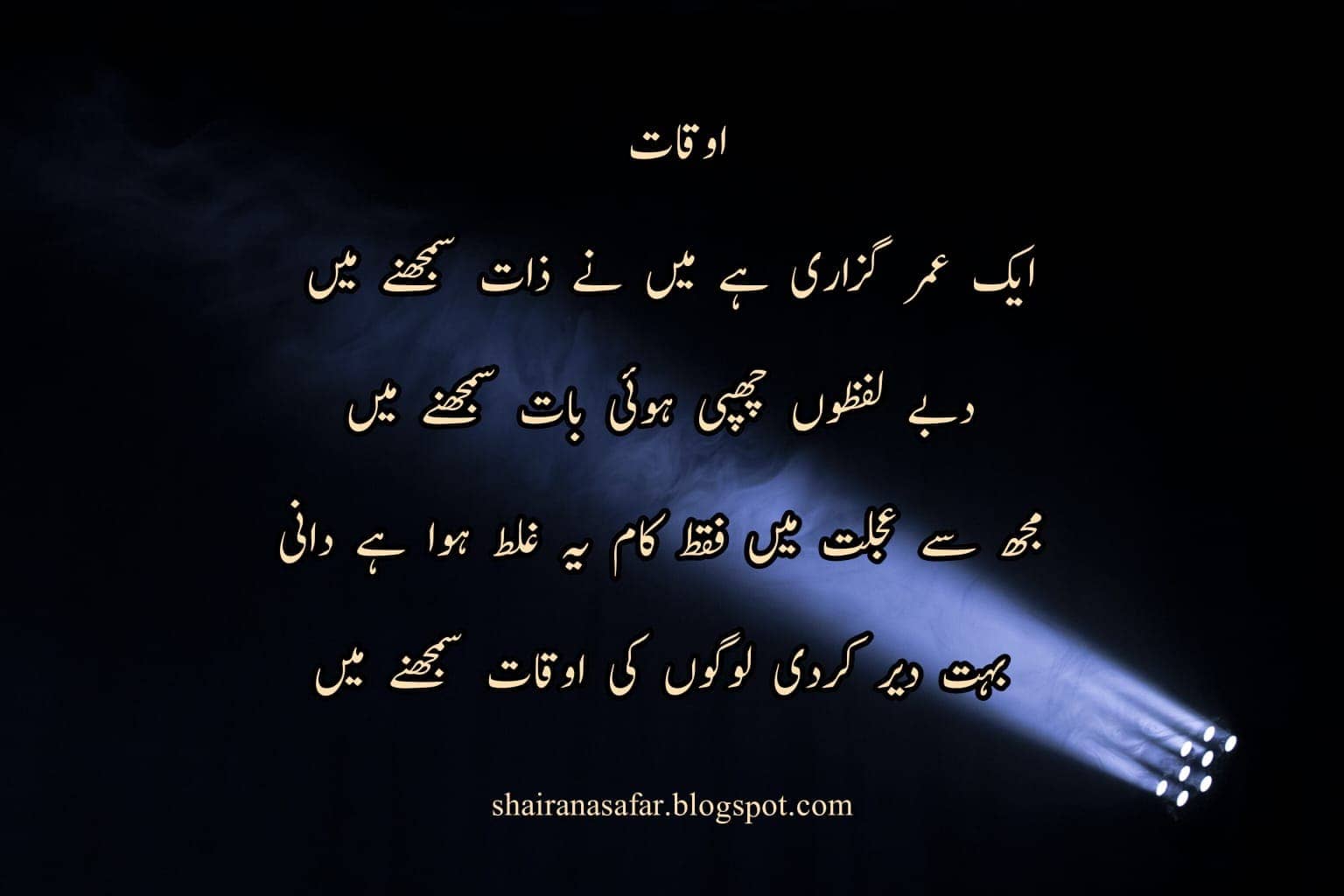Explore an enchanting journey through deep Shayari within
our "Shairana Safar," beautifully crafted by the poet Dr. Adnan Khan, delving into themes of love (Wafa), profound
reflections (Ghor-o-Fikr), the mirages of life (Sarab), the passage of time
(Auqaat), and the equilibrium of faith and governance (Muntaqil). Immerse
yourself in the profound world of emotions, where words resonate with human
experiences. Join us to enrich your perspective. Visit our website to
experience the magic of Urdu poetry.
وفا (Wafa)
This shayari explores the concept of "Wafa" takes center stage, symbolizing loyalty and faithfulness in a relationship, particularly in the context of "Muhabbat" (love). The poetry highlights that genuine love is deeply connected to faithfulness. It conveys that love is incomplete without this loyalty and commitment, making "Wafa" the foundation of love.
وفا
کون کہتا ہے کہ بے وفائی دانی
محبت کی ادائے خاص ہوتی ہے
محبت اور وہ بھی وفا کے بغیر ؟
وفا تو محبت کی اساس ہوتی ہے۔
Wafa
Kon kehta hai ke be wafai daani
Muhabbat ki adaye khaas hoti hai
Muhabbat aur woh bhi wafa ke baghair?
Wafa to muhabbat ki asas hoti hai.
غور و فکر (Ghor-o-Fikr)
In this Shayari, the poet discusses the act of writing poetry as a means to reflect on and express complex emotions, particularly in the face of challenging life circumstances (Haalaat). The poet focuses on the significance of "Ghor-o-Fikr," which represents deep contemplation and thought. The poem delves into the various "Pehlu" or facets of life and how these are expressed through the "Qalam" (pen). The poet identifies as a "Shaair," someone who uses "Lafzon" (words) to convey emotions and observations, particularly related to life's complexities.
غور و فکر کی خاطر ہی سب کو سوال دیتا ہوں
معاشرے کا ہر پہلو قلم سے کھنگال دیتا ہوں
کہتے ہیں لوگ مجھ کو شاعر اس ہی سبب
حالات کے چہرے کو لفظوں میں ڈھال دیتا ہوں
Ghor-o-fikr ki khatir hi sab ko sawaal
deta hoon
Muaashray ka har pehlu qalam se khankal
deta hoon
Kehte hain log mujh ko shaair is hi
sabab
Haalaat ke chehre ko lafzon mein daal
deta hoon.
سراب (Sarab)
In this shayari the word "Sarab," symbolizing mirages that can obscure one's perception of reality. It urges individuals to perceive life (Zindagi) with clarity, looking beyond the deceptive surface to understand the significance of relationships with (Paristaar) admirers, and the value of cherished bonds (Jigeri).
سراب
سراب کے نظاروں سے باہرآ
اپنے پرستاروں سے باہرآ
زندگی سمجھ آجائے گی تجھے
اپنے جگری یاروں سے باہرآ
Sarab
Sarab ke nazaron se bahar aa
Apne paristaaron se bahar aa
Zindagi samajh aa jayegi tujhe
Apne jigeri yaaron se bahar aa.
اوقات (Auqaat)
The core concept in this poetry is "Auqaat," signifying one's circumstances and limitations in life. The poet contemplates the passage of "Umar" (time or age) and the need to understand one's "Zaat" (identity or self). The poetry suggests that being aware of the concept of "Ajalat" or time and fate is crucial to navigating life effectively.
اوقات
ایک عمر گزاری ہے میں نے ذات سمجھنے میں
دبے لفظوں چھپی ہوئی بات سمجھنے میں
مجھ سے عجلت میں فقط کام یہ غلط ہوا ہےدانی
بہت دیر کردی لوگوں کی اوقات سمجھنے میں
Auqaat
Ek umar guzari hai main ne zaat samjhne mein
Dabi lafzon chipi hui baat samjhne mein
Mujh se ajalat mein sirf kaam yeh ghalt hua hai daani
Bohat deer kardi logon ki auqaat samjhne mein.
تشنگی (Tishnagi)
This poetry explores profound "tishnagi" in every spoken or written word, signifying the perpetual search for something meaningful. It raises questions about the people who come and go in our lives, leaving us with the constant busyness of existence. The words, "تشنگی" (yearning) and "جستجو" (search), signify the central theme of seeking connection and meaning in our interactions and experiences.
میری ہر بات میں تشنگی رہتی ہے
یہ جستجو ہی فقط سگی رہتی ہے
کون آیا، کون رکا اور کون چلا گیا
اس میں مصروف زندگی رہتی ہے
Meri har baat mein tishnagi rehti hai,
Yeh justuju hi faqat sagi rehti hai.
Kaun aaya, kaun ruka, aur kaun chala gaya,
Is mein masroof zindagi rehti hai.
منتقل (Muntaqil)
The poetry introduces the concept of "Muntaqil," implying transition or change. It delves into the discussion about "Aaburiyat" (rule or governance) and "Khilafat" (leadership or authority). The poet advocates for the singular rule of "Hakim" (a ruler), underscoring the concept of "Rububiyat" or divinity, asserting that human-made deities should be rejected in favor of one divine ruler, "Allah".

منتقل کے مقابل عبوریت نہیں چاہیے
خلافت قائم ہو جمہوریت نہیں چاہیے
ہو ایک ہی حاکم اور وہ فقط اللہ ہو
دنیا کے خداؤں کو ربوبیت نہیں چاہیے
Muntaqil ke maqabil aaburiyat nahi chahiye
Khilafat qaaim ho jamhooriyat nahi chahiye
Ho ek hi hakim aur woh sirf Allah ho
Duniya ke khudaon ko rububiyat nahi chahiye.












